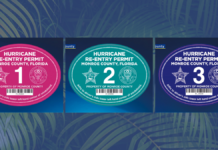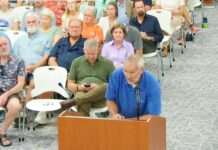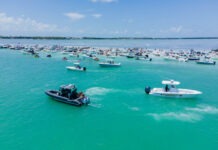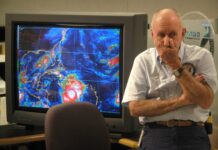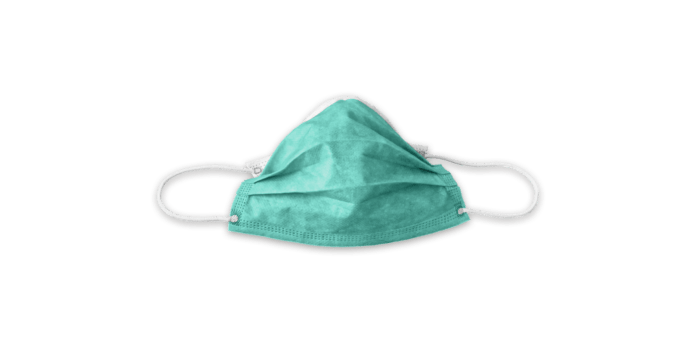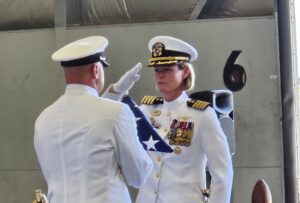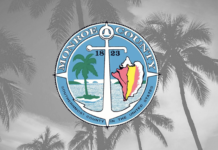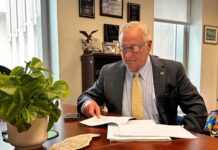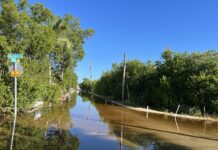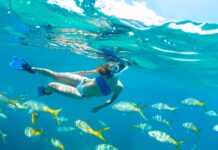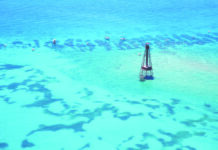No changes will be made just yet to a county ordinance mandating people to don a mask when entering restaurants, grocery stores and businesses.
Monroe County commissioners kicked off COVID-19 discussions during their Oct. 21 virtual meeting with a report from Bob Eadie, health officer for the Florida Health Department. While Eadie acknowledged no overload of COVID patients at local hospitals, he told commissioners that it would be “unwise” to relax measures like mask-wearing requirements with case starting to surge again in the country.
“I don’t see us going into lockdown, but I do see some restriction on activities later this winter if indeed we can’t get a majority of people here to do what they need to do,” he said. “When I say we’re going to learn to live with it, we will have to live with it. You won’t see meaningful vaccinations until probably the start of summer.”
While the facial covering ordinance remains in effect, no citations can be given to individuals per Gov. Ron DeSantis’ executive order that moved the state to a phase 3 reopening. Local code compliance can cite businesses, however, that fail to follow the local facial covering law.
County Attorney Bob Shillinger told commissioners he had no recommended changes to the mask ordinance, which doesn’t sunset until June 2021, upon hearing Eadie’s advice. Commissioners relayed similar sentiments.
“Keep it in place as it is,” said Commissioner Sylvia Murphy. “Please don’t lessen it.”
Per the ordinance, the mask-wearing requirement is subject to quarterly review.
Commissioners agreed to allow organized youth sport leagues to use county outdoor facilities like fields, provided participants sign waivers. The county isn’t currently allowing reservations for use of county buildings and rooms for indoor events among outside groups. For outdoor events on county property that trigger liability, organizers are required to have insurance with no exclusions for COVID-19 or infectious disease coverage.
“That’s proving challenging but not impossible to find a general liability policy that does not contain such an exclusion,” he said. “There was a group that had a paddleboard event on Higgs Beach; it took a whole week to find it, but they were able to find a general liability policy that didn’t contain an infectious disease exclusion.”
In talking to local municipalities, Assistant County Administrator Kevin Wilson said outdoor sport leagues that run their own programs in a city or village get waivers for individual participants. Wilson said Key West has leagues obtaining and certifying that they have health waivers from participants.
Commissioner Craig Cates said he supports allowing kids back onto fields, which will make a “huge difference in a kid’s life.” Murphy, who was the lone “no” vote, said the county should “stick with what we’re doing now.”
“Legally, it would be a slippery slope should anything happen,” she said. “If you came down with (COVID-19), could you prove where you got it? No. But you could accuse where you got it, and we’re left defending it.”
Commissioner Michelle Coldiron said she feels that the county is being punitive to parks in Key Largo and Big Pine Key in not allowing them to have sports when schools and municipalities are allowing sports programs to carry on.
As for funding the county is receiving to deal with COVID-19-related expenses through the federal CARES Act, Legislative Affairs Director Lisa Tennyson said the state released $3.25 million in early June with another $2.6 million anticipated shortly. That leaves a balance of $7.5 million for the county that will remain with the state on a cost-reimbursement basis.
Funding is restricted for response to public health and safety needs. Money can also be used in the form of economic relief to those affected by the pandemic. Tennyson said funds must be spent by Dec. 30, unless Congress grants an extension.
The $3.25 million in phase one funds were distributed between July and September for expenditures in the sheriff’s office and local municipalities. A rent and mortgage relief program was set up, which used $200,000. Tennyson said the Florida Finance Corp. provided around $680,000 in assistance for total rent relief of around $1.1 million.
A total of 259 small businesses with a sole proprietor or 25 or fewer employees received funding through a $1 million small business assistance program the county set up.
Tennyson outlined plans for phase two funding, which includes $1 million for another round of small business assistance, $1 million for nonprofit grant assistance and $600,000 for critical services including emergency food, utilities and rent assistance. Tennyson said officials are looking to cut a check to utility companies to cover arrears accounts among those affected by the pandemic. As for food, Tennyson said the county reached out to pantries to find out their needs for the next three months.
Remaining funds in phase three would go to support rent and other critical needs and other COVID-19 expenses incurred by governments.

